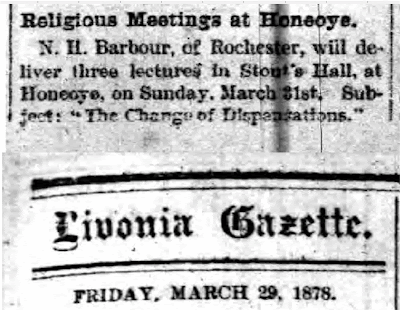Clearly, Separate Identity
will see a third volume. While we are sometimes disappointed by lack of detail
or an inability to find documentation, the amount of detail we have is
unexpected and pleasing. The story, as you’ve been told it, doesn’t always
change much, but it is more meaningful for the details.
Let me tell you about volume two as
we see it. Unwritten yet is a chapter about starting Zion’s Watch Tower and the
continuing controversies over the Ransom -Atonement doctrine. It exists only as
notes. It is probably the last chapter we’ll write. We consider the evolution
of a lay-preaching ministry and of the publishing ministry. Usually, all that
is said about this is that Russell called for ten thousand preachers. There is
a more complex story. And as usually told this is out of social context. We
restore that, making the story conform to what really happened. The circulation
of Food for Thinking Christians gets its own chapter. This was first
written sometime ago, but needs a re-write to accommodate new information. The
circulation of Food led to an enlarged international work. We tell in
separate chapters about the work in Canada and the United Kingdom. China,
various other lands, and Liberia are documented in a single chapter. The
foreign language work in the United States led to international mission work.
That gets its own chapter. Appended to the discussion of early evangelism in
the UK is a short section profiling one of the key, but overlooked, exponents
of Watch Tower doctrine in the UK. We discuss the organization and financing of
the work from the unincorporated tract society to its incorporation, profiling
the early directors. As with many of these
chapters, the story takes us places no-one else has gone.
We tell in some detail the work of
the earliest Watch Tower evangelists. Some of that has appeared as temporary
posts on this blog. New Workers in the Field tells of somewhat later
evangelists. Out of Babylon tells of efforts to separate from doctrines and
churches they believed failed Christ. We tell the story of clergy who took up
the new faith. One of the faults of more favorable ‘histories’ of the Watch
Tower movement is a tendency to ignore those who left the faith. We do not do
that, believing it distorts history.
We know there was some sort of
evangelism in France. Beyond a name and a letter or two, we cannot document it.
This is true of Norway and Denmark. The effort was so small I do not believe
any of that is recoverable. We have a single mention of Ireland. Again, I do
not believe we will find more.
Currently, we’re researching and
writing a chapter entitled “Approach to 1881.” Adherents saw that as a year of
prophetic fulfillments. We put their prophetic expectation in historical
context. If considered at all, most researchers say Watch Tower adherents
expected the end of the world in 1881. This is uniformed at best and a
purposeful misrepresentation at its worst. But much that followed swung off the
hinges of 1881. This will be a very blunt chapter and probably upsetting to
some of our readers. We managed to displease some with volume one and others
with our biography of N. Barbour. Why should volume two be different?
As it is now, volume three will
consider the divisions that followed; the writing and circulation of
Millennial Dawn, a chapter on the Watch Tower movement in historical context; a
chapter on Historical Idealism; a chapter on the Watch Tower movement’s connection
to other, unexpected movements.
We only cite contemporary documents
except when we consider some key comments by later writers. Do not expect us to
cite secondary sources. While this may play into your desire to lead readers to
opposition sources, it is not good practice. A sociologist might do that; a
historian should never do it.
We restore as nearly as possible the
warts, bumps, unlovely and lovely of the personalities who appear in this
history. We do not write sanitized history. If you want a paean to Russell,
this is not the book for you.
![Falcon's Crown: Kidnapped [e-book edition]](https://blogger.googleusercontent.com/img/a/AVvXsEhkBe00FOeBBmYbVCCTcdazS0iVnLd1WDFAqgsN2RZ54_2mWSQGowpbpnwmDREb-FVVk6AGpaGBEGezxxmeNm1qq65js_RZsBYwu6E6-3ucp3_YQyONvEK3NuIInA3Ru_cqrfm_JizezcrwPiewPQwunSXPJG1OI38N9mQwxOeGd4SvcPUf-DtO7FLMVcg=s238)

























